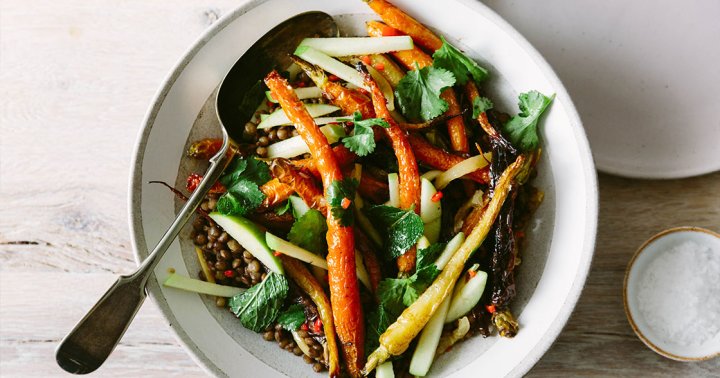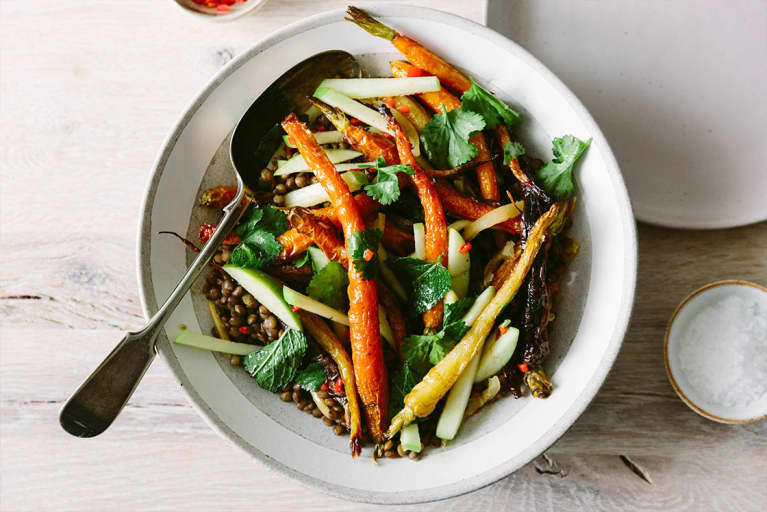Can Lentils Give You Food Poisoning? A Registered Dietitian Weighs In
A solid case for thoroughly cooking your legumes.


When you think of food poisoning, what comes to mind? Meat? Sure. Dairy? Most definitely. But legumes? As it turns out, maybe. It’s a good rule of thumb to be aware of the implications of really any food you’re eating, but the question is whether or not this extends to everyone's favorite plant-based protein source: lentils.
Maintaining a healthy understanding of how certain foods may affect you if they’re consumed cooked or raw can be helpful in preserving your digestive system (and giving you peace of mind), so we got to the bottom of whether or not you should be concerned about lentils potentially wreaking havoc on your body.
Can lentils give you food poisoning?
Lentils are perhaps one of the most diverse legumes you could include within your plant-based diet to fuel up on fiber and protein. However, potential issues may arise if they're not cooked adequately. “Consuming raw or undercooked lentils has been shown to cause nausea, vomiting, diarrhea, and gastrointestinal discomfort caused by the lectins in lentils,” says registered dietitian Jess Cording, M.S., R.D., CDN.
Functional Nutrition Training
A cutting-edge nutrition deep dive taught by the world’s foremost health & wellness experts

Lentils contain a specific form of protein called lectins, which may cause issues in the body, as Cording shares. This type of protein is also found in plant-based foods such as soybeans and peanuts.
“However, lectins are broken down by heat (in this case, bringing the lentils to a boil and then simmering until they’re tender), so it’s fine to consume them after they’ve been cooked,” explains Cording of the lectin content in lentils. It’s best to think about preparing your legumes like preparing meat in order to avoid potential problems—cook them as directed.
How you can reduce the risk of potential food poisoning from lentils.
While it's always important to cook your lentils entirely to keep yourself safe, there are other ways you may be able to lower your risk of potential lectin-related food poisoning. “Soaking the lentils before cooking is also believed to help neutralize the lectins,” notes Cording. Pressure-cooking them may be helpful, as well.
It’s unlikely that tasting a small bite of undercooked lentils will cause any digestive issues, but Cording warns that eating a full portion is more likely to lead to concerning symptoms.
Your ideal lentil serving size.
Plant-based eaters can breathe a sigh of relief—there’s really no hard and fast upper-limit to how many lentils you can eat in a day. That being said, lentils are naturally packed with fiber (nine grams per half cup), and an excess of fiber may be linked to GI discomfort, as well. “Eating more than a cup or so of cooked lentils would likely feel physically uncomfortable regardless of how well they are cooked,” notes Cording.
There are also plenty of other protein options available for vegetarian or vegan diets, so if you feel you need a break from lentils try tofu, black beans, and even nutritional yeast to help fuel and satisfy your body.
Ultimately, it's not necessary to nix lentils: They're an excellent, versatile source of protein and fiber, which can nourish the body. Just remember that following a plant-based diet doesn’t exempt you from the possibility of food poisoning, but rest-assured: cooking your food thoroughly (including lentils) before consumption will significantly reduce your chances.
https://www.mindbodygreen.com/articles/can-lentils-give-you-food-poisoning

 MikeTyes
MikeTyes 
































